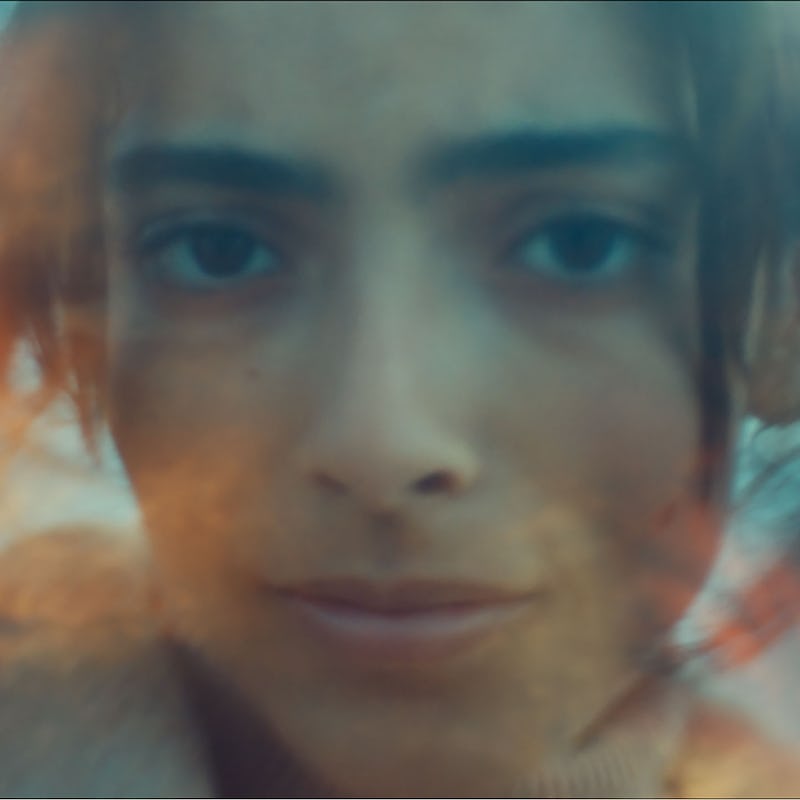Animalia is an alien invasion movie with metaphysical dreams
Sofia Alaoui’s Animalia is confounding, cosmic, and wonderful.

After 10 minutes of terse politeness and stifling silence in Sofia Alaoui’s Animalia, the tension breaks with a needle-drop.
Itto (Oumaïma Barid) is gloriously pregnant and left to her own devices by her husband Amine (Mehdi Dehbi) and his obliviously rich family. She cracks a smile as her in-laws drive off; with a slight rise of her lips, The Isley Brothers’ “It’s Your Thing” bursts over the soundtrack, and Itto glides through Amine’s mansion, plopping herself down on a couch so unbearably luxe that it’s easy to imagine her mother in-law, Hajar (Souad Khouyi), declaring “snacking” and “putting one’s feet on the cushions” as criminal offenses.
Itto puts her feet up. She snacks. She casually burps, too, a joyful eruption that matches Ronald, Kelly, and Rudolph’s vocals and Ernie’s bass. If bliss could be defined in a single image, it’d be Alaoui’s long shot of Barid lounging at the peak of comfort, despite Itto’s obvious prenatal pains.
Animalia unfolds largely outside of this setting, but the filmmaker’s choice to highlight the opulence Itto has married into is meaningful. The world is vast, and humans are infernally convinced that they can master its boundlessness either through religious practice, or self-insulation. When you make your home the grandest landmark — natural or manmade — for miles around and beyond, you’re doing it to make a statement: I am man, and I reign over all I survey.
Man is a fool, of course, because otherwise Alaoui wouldn’t have much of a movie on her hands. A treacherous storm starts a-brewin’ as Itto’s “me time” winds down, stranding Amine, Hajar, and the rest of the gang at the governor’s estate in Khouribga, the capital city in Morocco’s Khouribga Province. It’s too dangerous for them to leave Khouribga, or for Itto to join them, but it’s also dangerous for her to remain alone when the military has set up shop by a nearby lake. So Itto hitches a ride with a neighbor, who takes her money and swiftly abandons her in a burg that most certainly is not Khouribga, giving Animalia a piece of evidence to support its thesis about human behavior in crises. In short, people aren’t to be trusted.
Gods aren’t to be trusted, either. Itto prays throughout Animalia, but between her prayers going unanswered and her interactions with people going sour, the promise of an otherworldly figure she can safely invest her trust in sounds tempting. Animalia humbly makes a counterargument: Better the devil you know than the devil you don’t.
Itto (Oumaïma Barid) lounges in a bathtub before the action kicks off.
The devil is alien in this case, or some other ineffable supernatural whatist — Alaoui doesn’t elaborate on its place of origin, a decision that works in the film’s favor. When Itto approaches a looming green-flashing cloud wall, the audience can’t make any assumption about what she’s walking into. It could be pure evil. It could be a door to enlightenment. Whether of this world or not, though, the presence at the storm’s centers reveals itself through colossal nimbuses, widespread inexplicable animal activity, and occasional inexplicable human activity, too.
“Everything is going to be alright,” goes a common assurance among strangers Itto meets on her quest to reunite with Amine in Khouribga, including one young weirdo credited only as “L’ado” (Mohamed Lahbiib), whose unflagging smile reads as at first as leering. As Animalia progresses, we realize that there’s more to his toothy, blank grin than meets the eye. Random passersby increasingly show Itto their own pearly whites right up to the end, too, though what that means, exactly, remains elusive, as much to the viewer as to Itto.
This makes the ambiguity acceptable, and even enriching, particularly in Itto’s closing monologue, where she wonders and theorizes and conjectures but makes no solid conclusions about the film’s events. All she can say, in fact, is that “what isn’t connected has no existence on Earth or elsewhere. And that’s why all these things, which are part of the one, are precious.” As big significant epiphanies go, this one’s pretty good, and in the absence of a concrete explanation of what in the cosmic hell happens in Animalia, it’ll do nicely. Besides: Animalia isn’t the kind of film that needs to be explained. It’s the kind that needs to be experienced, which dovetails with Itto’s up-close encounter with the entity 45 minutes into the narrative.
Alaoui constructs this sequence with a handful of different techniques: Match dissolves, double exposures, step-printing. The result of their mixture is dreamlike. Itto watches herself stand up to meet L’ado, then finds herself suddenly transported to Amine’s side at the governor’s mansion, and then she’s hanging out with a bunch of sheep, one of whom she believes may or may not have been her own mother. It’s a heavy trip. But Animalia pulls off the combination of camera tricks and raw performance power, landing right in that genre-film sweet spot where the visuals thrum with the power of metaphysical free-associative hijinks and grounded human emotion. Barid has the harder task compared to Alaoui, editor Héloïse Pelloquet, and director of photograhy Noé Bach; they’re responsible for shooting and assembly, but if Barid can’t bring the audience along with her on her brief voyage through time and space, then Animalia doesn’t work.
Happily, she does. If Animalia makes any stumbles worth noting, it’s perhaps the overuse of these techniques in the finale, where that grounding threatens to slip away when it’s most necessary. But maybe there’s no point in keeping the film anchored when Alaoui’s plot and the extent of the alien’s purpose on Earth finally come full circle. Maybe a taste of anti-reality is necessary, especially for Itto’s parting thoughts. After all, these moments are all part of the one — and that makes them precious.
Animalia premiered at Sundance on January 20 and is available virtually through January 24.